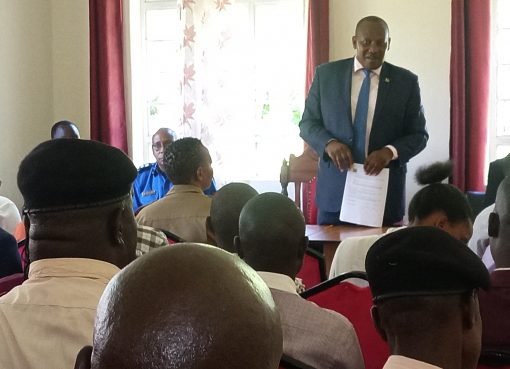Violence against women is still high in Migori County despite the punitive measures put by the government after the enactment of the Sexual Offences Act in 2006.
Between January 2022 and June 2024, the region registered its worst grip on the crime, with the leading being sexual abuse and wife battering.
Other forms of violence against women are the age-old forced early marriage, female circumcision, otherwise popularly known as Female Genital Mutilation (FGM), and child labour practices.
While national statistics indicate that every half an hour a woman is sexually assaulted in Kenya, research has revealed that rape, defilement, and wife battering were recorded after every fortnight within Migori County’s Kuria West, Kuria East, and Uriri sub-counties during this period.
Often, it was a baby girl, a girl, or a woman who was subjected to the dehumanising experience, which burns the victims’ souls with lifetime scars if they survive the ordeal.
According to the children’s department in the area, some 400 cases of sexual abuse were reported between January 2022 and December 2023 alone for dispensation.
“This is the number we handled in our offices. We do not know the number of cases reported to the police directly during the same period to give you an accurate figure for the whole period in question,” says the County children Services Coordinator Sammy Korir.
But the local police confirmed handling some 700 rapes and other forms of sexual harassment, including abusive language and gestures, sexual advances, touching and groping, passing unwanted notes, and character assassination through graphics.
“However, not all cases of rape and other forms of sexual assault were reported, meaning that the number could be much higher than quoted,” says a police report on the gender-based violence that KNA managed to peruse.
Statistics which have been compiled in local hospitals and community and faith-based organisations where the victims go for treatment and counselling approximate that there were at least 1,000 rapes and defilements during the period, indicating an increase of about 400 cases compared to previous years.
Whereas many would think that rape and sexual assaults in general are crimes perpetrated by people who are strangers to the victims, the shocking reality is that at least one third of those sexually violated in the region during the period knew those who attacked them.
But many victims opted to remain silent, fearing embarrassment, humiliation, and shame.
“Most victims were often times silent sufferers, particularly those who were in the same environment with their attackers,” says Mr. Korir.
According to Mrs. Mogesi Ghati, a psychiatric based in Kegonga town, sexual violence has many harmful consequences, both short and long term, which include trauma, depression, unwanted pregnancy, pelvic inflammatory disease, infertility, STDs, partial or permanent disability, HIV/AIDS, suicide, and death.
Psychological consequences of sexual violence include fear, distrust, and anxiety; feelings of guilt and shame; depression; and even thoughts of suicide.
A national survey carried out on child abuse in Kenya in 2006 indicated that nearly two out of 10 girls who have been raped or defiled become pregnant, and close to three out of 10 contract a sexually transmitted infection.
Mrs. Ghati says that survivors of sexual violence suffer from isolation, stigmatisation, poor performance at work, absenteeism and financial difficulties. The impact of sexual offences on schoolgirls is greater given that they have a young mind and cannot cope with such stressful circumstances, adds the psychology expert.
Says Ghati: “Sexual harassment has far-reaching implications for teaching and learning processes. Consider a girl who has just been sexually harassed by a male teacher. Such a girl will be traumatised and unable to concentrate on her studies. The presence of the perpetrator will elicit anger, fear, and resentment that hinder learning.”
This affects the girl’s participation in education to a great extent, says the children’s boss, Mr. Korir, who described the Kuria region as a hot spot for school dropouts among girls who have undergone sexual abuse.
Information available at the department estimates that some 200 girls dropped out of school between 2022 and June 2024 as a result of unwanted pregnancies. Of the number, about 10 per cent of the girls dropped out because of pregnancies that arose out of rape and defilement. The remaining number were pushed out of school as a result of the age-old forced early marriage, female circumcision, popularly known as female genital mutilation (FGM), and child labour practices.
Pregnancy and eventual early marriage of the girls were mainly perpetrated by the victim’s fellow pupils and students, their own teachers, and roaming old men in villages.
As a result of this, several non-governmental organisations and community and faith-based groups have for years been forced to pitch camps in the County to try to fight the vice.
Maendeleo ya Wanawake organisation, initially led by the late Mrs. Beatrice Robi, has been in the forefront for many years campaigning to eradicate the vice, but with little success.
Other organisations that had engaged in this course of fighting forced early marriages, FGM, and child labour include ActionAid, Germany Technical Agency (GTZ), and Adventist Development Relief Agency (ADRA), which became very vocal against what they call outdated practices between the years 2006 and 2021.
ActionAid, GTZ, and ADRA had in the past years pooled resources in partnership with the local government administration to fight violence against women by introducing alternative ways of eliminating FGM, but in vain.
Education officials within the Kuria region say most girls from the community are usually married off by their parents in exchange for dowry immediately after the cut, leading to massive dropouts of girls.
“For violence against women to be eradicated in the region, there is need for strict implementation of the Sexual Offences Act by the various law enforcement agencies in the area,” concludes Korir.
By George Agimba





